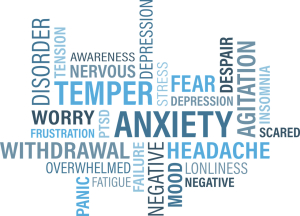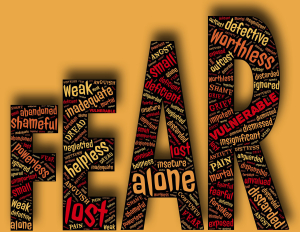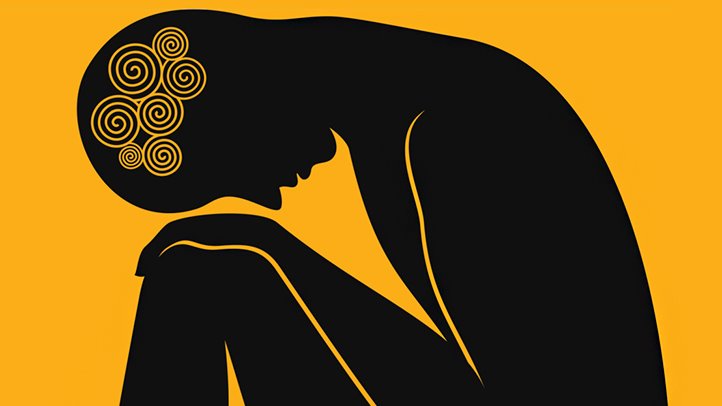 Anxiety is considered one of the most common mental health problems in the western world; in 2013 there were 8.2 million cases recorded in the UK alone.
Anxiety is considered one of the most common mental health problems in the western world; in 2013 there were 8.2 million cases recorded in the UK alone.
So what is anxiety? Many people describe anxiety as a sense of worry, unease and feeling scared. These in themselves are ‘normal’ feelings that we all experience from time to time. It’s not unusual to feel nervous about certain decisions or events that have a large impact on our lives such as moving house, having a baby, starting a new job, sitting an exam, being diagnosed with an illness, deciding to get married or separating from your partner, and many more milestones that we face through our lives. Anxiety can cause us to lose sleep, it affects our eating habits and concentration, although if it continues to affect our lives for a longer period that outlasts the event we were worrying about then it can become a mental health problem.
Everyone’s experience of anxiety is different, however below are some physical and psychological symptoms that indicate an anxiety problem, if you find yourself identifying with any of these then it may be worth speaking to a professional.
Physical Symptoms
- Nausea
- Headaches
- Tense muscles and body aches.
- Pins and Needles
- Feeling light headed or dizzy
- Sweating or hot flushes
- High pulse rate
- Raised blood pressure
- Difficulty sleeping
- Churning in the pit of your stomach
Psychological Symptoms
- Having a constant sense of dread or feeling the worst
- Feeling tense, nervous and on edge all the time
- Feeling like you’re being watched and judged all the time
- Feeling like everything slows down, or speeds up
- Dwelling on negative thoughts / Rumination
- Feeling numb
- Feeling like you mind is so full, that you can’t switch off
- Feeling restless and not being able to concentrate
- Feeling like you’re not in control
Because anxiety is a normal human experience, it’s sometimes hard to know when it becomes a problem for us, especially if we learn to cope with the above symptoms and carry on with every day things. Sometimes we can go on for years like this, however over time our anxiety can worsen. It’s our body’s way of saying that something needs to be addressed.
 Anxiety triggers our flight or fight response, which is our biological way of protecting ourselves from danger. Our flight or fight responses are usually triggered when we feel threatened. In primitive times it was physical danger, which is why it’s such a physical response, however in modern society the threat is mental, such as stress or trauma.
Anxiety triggers our flight or fight response, which is our biological way of protecting ourselves from danger. Our flight or fight responses are usually triggered when we feel threatened. In primitive times it was physical danger, which is why it’s such a physical response, however in modern society the threat is mental, such as stress or trauma.
Our subconscious protects us from things and situations we fear by causing anxiety; if you are suffering from anxiety, maybe thinking about what it is that you fear will help what is triggering your anxiety.
There are specific anxiety disorders that concentrate on certain fears. These include:
Agoraphobia – This is an anxiety disorder that causes intense fear surrounding certain situations, such as being in public spaces, leaving your home, being in large crowds and using public transport.
Body dysmorphic disorder (BDD) – If you have this disorder you will be very worried about the way you look, or a certain part of your body. Other people will not notice a problem, but it will make you feel distressed.
Generalised anxiety disorder (GAD) – This is the most common of the anxiety disorders. The NHS estimates that GAD affects up to 5% of the UK population. The disorder causes sufferers to feel anxious a lot of the time, often without a specific cause.
Obsessive-compulsive disorder (OCD) – This causes the sufferer to have obsessional thoughts and compulsions to carry out certain actions. It is estimated that 12 out of every 1000 people have OCD.
Panic disorder – Causing sufferers to have panic attacks, this disorder can be debilitating. Most panic attacks last between five and 20 minutes and cause physical symptoms which, while not damaging to health, can be very frightening.
If your feelings of anxiety are very strong, or last for a long time, it can be overwhelming; try to talk to someone about it. If it’s stopping you from leading the life you want, then it’s definitely worth taking a step towards change.


Leave a Reply